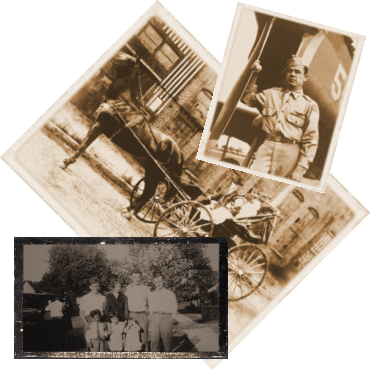Genealogy
A Google search using the word “genealogy” will return more than 35,600,000 links. That’s 9.6 million more links than just 2 years ago. Genealogy is one of the fastest growing activities in America. Did you say that you couldn’t find anything about your ancestor on the internet yesterday? Well, that was yesterday. You can find new websites and new techniques almost every day. That elusive ancestor may just be a click away. Here are some very basic genealogical tips to get you started followed by a list of websites that might help you in your quest.
Generations 1 to 3
 Most people know a great deal about, but seldom document, the first three generations of their ancestry: themselves, their parents, and their grandparents. Can you prove when and where you were born and who your parents are? Can you do the same for your grandparents? That’s exactly what you will have to do to join most Genealogical Societies. So, now is the time to get organized.
Most people know a great deal about, but seldom document, the first three generations of their ancestry: themselves, their parents, and their grandparents. Can you prove when and where you were born and who your parents are? Can you do the same for your grandparents? That’s exactly what you will have to do to join most Genealogical Societies. So, now is the time to get organized.
For purposes of joining the Sons of the American Revolution or most other societies, the most desirable document for the first three generations are birth certificates. If possible, talk to your parents and grandparents about where and when they were born. They may be able to give you a copy of their birth certificates. If not, you will at least know where and when they were born so that you can request a copy. One of the quickest ways of finding where to request birth and death certificates, often referred to as “Vital Records,” is from the Cindi’s List Website. Here you will find a link to Vital Records for every state in the union and many foreign countries. In some cases you can make your request right on line for a nominal fee as opposed to a long trip. If not, usually there is at least a form you can fill out online and send in with your check. For instance, in Georgia, you can fill out a birth certificate request for yourself, your spouse, your parents and/or grandparents from the Georgia Department of Human Resources and mail it in with a certified check.
Birth certificates are a 20th century concept. Your grandparents may not have a birth certificate. However, they may have what is called a “Delayed Birth Certificate” issued by a court. If they have passed away, there should be a death record. And don’t forget about proof of marriage. Another good document source for the first three generations of your genealogy is Vital Check Express, a one stop shop for birth, death, marriage, and divorce records.
Generations 4 to Patriot Ancestor
As you are putting your family genealogy together, keep in mind that you are not just documenting the existence of an individual, but documenting how that individual fits into your family tree. In other words, you want to prove the LINK from one generation to the next. If you do not do that, what you really have is a set of disjointed individual histories that either family lore or a leap of faith claims a relationship.
The documents available to make these links are almost endless. One of the most common documents is a government census. The information available on a census changes from one decade to the next. However, the information to prove a father/mother-to-child relationship is on the US census since 1850. You can use earlier census information to prove when and where a particular head-of-household was residing at the time of the census, how many were in the household and possibly a geographical relationship to other individuals in the area. Census information before 1850 will not stand on its own in proving relationships. However, you can definitely use it to support other primary documents.
There was a time, not too long ago, that you would have to make a trip to a government facility, like the National Archives located in Morrow, Georgia, to acquire census information. If that is a reasonable journey, you can still do that. Today, the same US census, from 1790 to 1940, is available online through such websites as Ancestry.com with a nominal charge that you can easily offset with the savings in time and travel expenses.
Other basic documents you will want to consider are Wills that identify a surviving spouse and children AND Bible Records that often identify the mother and father of a child. You can often request a Will by phone. However, you will most likely make a trip to the locale where your ancestor was born, lived, and/or died. The county courthouse contains a wealth of information beyond the Will and Probate of a Will. After gleaning what you can from the courthouse, check the local church, cemeteries, and library. Many communities proudly tout a local library with a genealogy department. It is in the local library that you will most likely find that book that records some aspect of your ancestor.
You will also want to visit the larger regional and national libraries dedicated to genealogical research. But this webpage is not designed to instruct the reader in all sources of genealogical material. Instead, we hope we have given you some flavor for the genealogical resources that await you. Click on our Genealogist’s Favorites for a Detailed Categorized List of Genealogical Websites. Listed below are some of the more popular and/or well known Genealogy links.